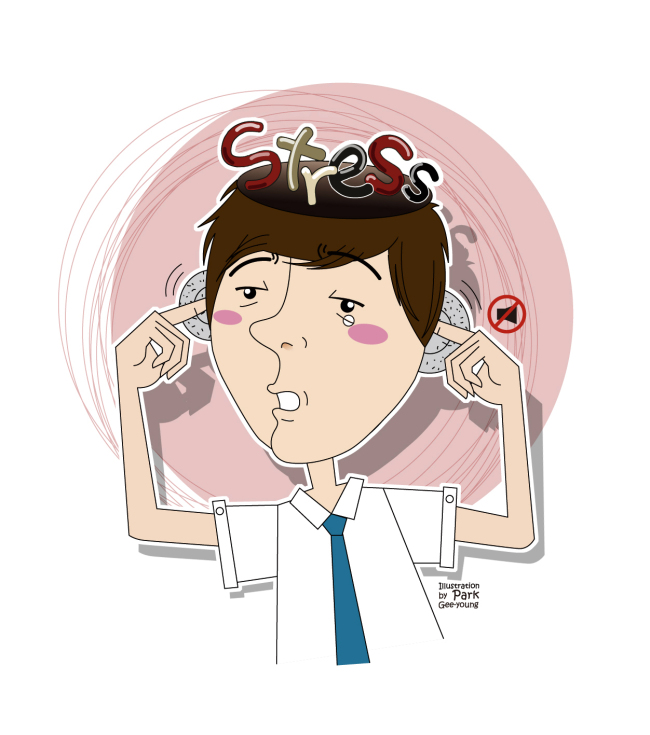People working in a noisy environment can develop hearing impairment as a work-related problem. The noise level from woodturning can easily exceed 90 decibels, which is the level that can cause hearing impairment. Therefore, if you work in such environments it is important that you wear earplugs.
An increasing number of young people are developing hearing impairment with the use of MP3 players and other devices. The volume on many sets of headphones can exceed 90 decibels, so it is important not to listen to music in this way for a prolonged time, and to have breaks in between. The noise from motorcycle gangs, which are popular these days, can also affect the hearing and therefore should be avoided.
Children can commonly develop otitis media, or inflammation of the middle ear, from the common cold, which can affect hearing. Chronic colds should receive attention from an ENT doctor.
Age-related hearing impairment can be caused by chronic adult diseases that lead to declining hearing function. It is important to maintain a healthy blood pressure, exercise regularly, prevent excessive stress and fatigue, get sufficient rest and limit the consumption of coffee, coke and smoking, as well as neuroexcitants and salt.
Those with hearing problems should inform his or her doctor to avoid medications that can affect hearing.
An increasing number of young people are developing hearing impairment with the use of MP3 players and other devices. The volume on many sets of headphones can exceed 90 decibels, so it is important not to listen to music in this way for a prolonged time, and to have breaks in between. The noise from motorcycle gangs, which are popular these days, can also affect the hearing and therefore should be avoided.
Children can commonly develop otitis media, or inflammation of the middle ear, from the common cold, which can affect hearing. Chronic colds should receive attention from an ENT doctor.
Age-related hearing impairment can be caused by chronic adult diseases that lead to declining hearing function. It is important to maintain a healthy blood pressure, exercise regularly, prevent excessive stress and fatigue, get sufficient rest and limit the consumption of coffee, coke and smoking, as well as neuroexcitants and salt.
Those with hearing problems should inform his or her doctor to avoid medications that can affect hearing.

Stress-induced hearing impairment
Acquired hearing impairment has various causes. In children, acute or persistent ear infections can cause conductive hearing loss, whereas in adults, chronic otitis media can cause conductive hearing loss with discharge from the ear. Causes of sensorineural hearing loss include sudden hearing loss, noise-induced trauma (noise-induced hearing loss), antibiotic injections and other ototoxic medication, Meniere Disease with severe dizziness, otitis interna, acoustic tumors and others. Age-related hearing loss is a very common cause.
Stress induced hearing loss can be divided into sudden hearing loss and Meniere Disease. To prevent such stress induced hearing loss, it is important to minimize stress. However, if sudden hearing loss, dizziness, muffled hearing and tinnitus, or ringing in the ears, occurs, you must see a doctor immediately. Sudden hearing loss is best diagnosed and treated within one week of occurrence.
Sudden hearing loss
Patients who present with “sudden hearing loss with tinnitus after waking up from sleep” are most likely to have sudden onset hearing loss. Sudden onset hearing loss is a sensorineural hearing loss that arise acutely within hours or 2-3 days, of which one-third of cases are found when the patient wakes up in the morning and can occur with ringing in the ears and dizziness. Various things can cause it, and although it is difficult to identify the exact causal agent, it can arise from invasion of the acoustic nerve by viral infection or by blockage of vessels to the cochlea. Stress is thought to be another cause of sensorineural hearing loss. Other causes include trauma, or ototoxic agents, and in rare cases, a tumor that puts pressure on the acoustic cranial nerve. Therefore, appropriate tests must be conducted to identify the cause.
It is difficult to predict the prognosis, but about half of these patients recover their hearing function within a few days. Those with severe hearing loss with dizziness often have more difficulties with recovery.
The treatment generally consists of rest, steroid hormones, vasodilators to improve the blood supply to the cochlea, and although the role of medications is not clear, they are known to help with the recovery.
Sudden onset hearing loss must be diagnosed and treated within one week of the occurrence. Early diagnosis is crucial, so if you experience sudden hearing difficulties or muffled sounds, please visit the hospital to be tested for sudden onset hearing loss.
Meniere disease
Meniere Disease, named after a French doctor in the 1800s, refers to a group of symptoms including hearing loss, tinnitus, muffled hearing and severe dizziness. The causes identified so far include autoimmune disease, allergy, syphilis, otitis media, thyroid disease and tumors, but in most cases the cause is not identified.
Autopsies of patients who had Meniere Disease showed enlarged endolymphatic space in the cochlea, suggesting a role of abnormal endolymphatic secretion and absorption in the inner ear, causing endolymphatic edema, in the mechanism.
Dizziness, hearing loss and tinnitus
The cause of Meniere Disease is often unidentified, so the diagnosis is made on the medical history of the patient. The characteristic dizziness that these patients complain of are spinning dizziness, where the patient feels that the surroundings or him or herself are spinning around, or by objects looking like they are leaning to one side. The dizziness lasts for more than 20 minutes and regresses within 24 hours. It usually repeats and patients can have normal lives when they are not experiencing dizziness. When they do experience dizziness, they often experience nausea and vomiting, along hearing loss, tinnitus and sensation of muffling in the ears.
Patients often feel tinnitus with sounds becoming louder, and the muffled feeling is as if there is water in the ears before the dizziness starts. Hearing can decrease with dizziness, but usually improves when the dizziness subsides. However, with repeated episodes of dizziness, hearing loss becomes progressively worse and tinnitus can remain. Approximately 30 percent of Meniere Disease is bilateral.
Tests that can help the diagnosis of Meniere Disease include hearing tests and vestibular function test. To distinguish between Meniere Disease of a known cause, blood tests, X-rays and MRIs may also be conducted.
Most are treated medically
Treatment options for Meniere Disease include medical treatment, injection of medication in the middle ear and surgical treatment. Drug treatment consists of dietary changes such as a low sodium diet and use of diuretics. It is reported that 60-70 percent of patients respond well to medicine. Those who fail with this treatment can receive medication in the middle ear to reduce the vestibular function, or receive surgical treatment. The aim of treatment of Meniere Disease is to prevent the recurrence of symptoms and improve the symptoms that patients experience.

By Chung Won-ho
The author is a doctor at Department of Otorhinolaryngology at Samsung Medical Center and a professor of Sungkyunkwan University School of Medicine. ― Ed.
-
Articles by Korea Herald












![[From the Scene] Monks, Buddhists hail return of remains of Buddhas](http://res.heraldm.com/phpwas/restmb_idxmake.php?idx=644&simg=/content/image/2024/04/19/20240419050617_0.jpg&u=20240419175937)



![[From the Scene] Monks, Buddhists hail return of remains of Buddhas](http://res.heraldm.com/phpwas/restmb_idxmake.php?idx=652&simg=/content/image/2024/04/19/20240419050617_0.jpg&u=20240419175937)

![[KH Explains] Hyundai's full hybrid edge to pay off amid slow transition to pure EVs](http://res.heraldm.com/phpwas/restmb_idxmake.php?idx=652&simg=/content/image/2024/04/18/20240418050645_0.jpg&u=20240419100350)

![[Today’s K-pop] Illit drops debut single remix](http://res.heraldm.com/phpwas/restmb_idxmake.php?idx=642&simg=/content/image/2024/04/19/20240419050612_0.jpg&u=)